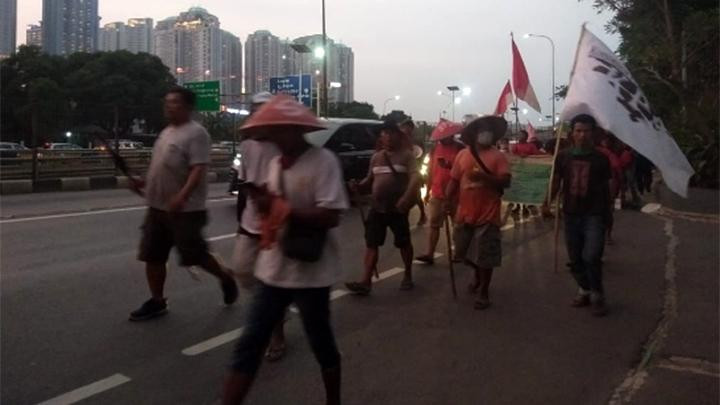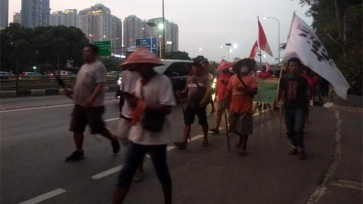Popular Reads
Top Results
Can't find what you're looking for?
View all search resultsPopular Reads
Top Results
Can't find what you're looking for?
View all search resultsGenuine agrarian reform should prioritize landless people
Agrarian conflicts have damaged society, culture and development, and downgraded the fulfillment and protection of human rights.
Change text size
Gift Premium Articles
to Anyone
 Protesting farmers from Deli Serdang regency, North Sumatra arrive on Friday, Aug. 7. 2020, in Jakarta. They are part of 170 farmers that walked thousands of kilometers from their homes to the capital city to protest what they perceive as President Joko "Jokowi" Widodo's failure to implement agrarian reform. (Tempo.co/-)
Protesting farmers from Deli Serdang regency, North Sumatra arrive on Friday, Aug. 7. 2020, in Jakarta. They are part of 170 farmers that walked thousands of kilometers from their homes to the capital city to protest what they perceive as President Joko "Jokowi" Widodo's failure to implement agrarian reform. (Tempo.co/-)
T
he challenge facing the current government as well as the incoming government under Prabowo Subianto and Gibran Rakabuming Raka on the agrarian reform agenda is how to sustainably and fairly regulate, control and utilize agrarian resources like earth, water and natural resources, amid the government's agenda of providing “a red carpet” for investment.
The commemoration of National Farmers' Day or Agrarian Day every Sept. 24 is an opportunity to seek a model and policy for genuine agrarian reform.
Agrarian resources are very important and essential for the protection and fulfillment of human rights. Land and natural resources are an important part of human life and livelihood, a source of work and livelihood, a source of food and medicine, a place to live and an important part of the beliefs of various religions, beliefs and culture.
Development policies that are oriented toward economic growth and the paradigm of agrarianism which is viewed only as a commodity have caused the state to prioritize the use of agrarianism and large-scale economic and development actors. Land and natural resources as economic commodities are exploited in order to increase state and regional income.
The Job Creation Law was predicted to create jobs and increase state revenues and national economic growth. However, haphazard investment has increased pressure on agrarian resources, environmental damage and uprooted communities from their living space, thereby violating human rights.
Based on data from the Consortium for Agrarian Reform (KPA), agrarian conflicts during the presidency of Joko “Jokowi” Widodo (2014-2024) almost doubled to 2,939 cases affecting 1.75 million households compared to 1,520 conflicts affecting was 977,103 households during the presidency of Susilo Bambang Yudhoyono (2004-2014).
Meanwhile, the National Commission on Human Rights (Komnas HAM) within the period of January 2020-August 2024 received and handled 2,639 cases of agrarian conflicts, with the most classifications being land conflicts related to plantations, infrastructure, mining and national strategic projects.


















